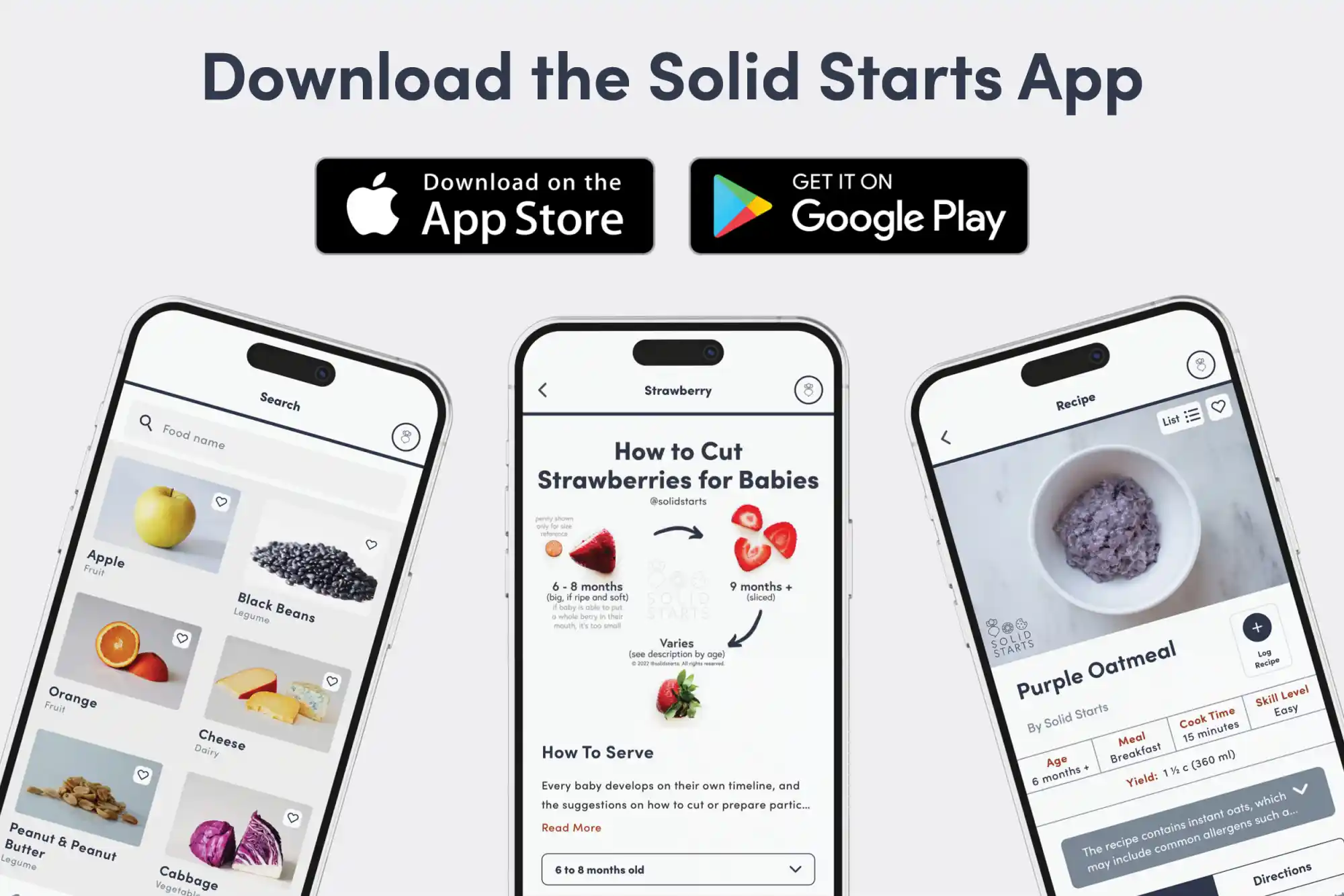Access our First Foods® Database in the Solid Starts App.
Learn morePomegranate
Fruit
Age Suggestion
6 months
Iron-Rich
No
Common Allergen
No

When can babies have pomegranate?
Pomegranate seeds may be introduced as soon as baby is ready to start solids, which is generally around 6 months of age. Note that acidic foods like pomegranate can cause or worsen diaper rash.
Pomegranates are native to Southwest Asia, where the fruits grow on flowering trees and shrubs. Within the rich, red skin of each fruit, there is an inedible white flesh that houses hundreds of jewel-toned seeds, each with a sweet, tart, and slightly tannic flavor. The pomegranate continues to be an important crop in its native region, where its juicy seeds are a beloved snack and widely used to make juice, salsas, and syrups that are used in savory chicken, eggplant, and fish dishes, among others.
How do you serve pomegranate to babies?
Every baby develops on their own timeline, and the suggestions on how to cut or prepare particular foods are generalizations for a broad audience.
6 months old +:
Serve crushed or fully flattened pomegranate seeds that have been stirred into a sauce or a scoopable food like warm cereal or yogurt. Hold off on serving whole pomegranate seeds, which pose an increased choking risk due to their small size and slippery, firm consistency.
9 months old +:
Serve crushed or fully flattened pomegranate seeds on their own for baby to pick up with their developing pincer grasp. If baby struggles in picking up the small, slippery pieces of food, feel free to serve the crushed pomegranate seeds mixed into sauces or scoopable foods.
12 months old +:
At this age, as long as the child is demonstrating mature eating skills like not overstuffing their mouth with food, chewing thoroughly, and spitting out food when it’s too much, you can consider serving whole pomegranate seeds on their own. Consider serving only a few pomegranate seeds on the tray or table at a time to help the child pace themselves. If you’d like, you can also continue to stir crushed pomegranate seeds into scoopable foods. Hold off on serving whole pomegranate seeds stirred into scoopable foods or mixed dishes, as the child may be less able to manage the food’s consistency when handling other foods in the mouth as well. Many children will be ready for whole seeds in a mixed dish closer to 18 months of age, or whenever you notice them consistently and thoroughly chewing food.

How to prepare pomegranate safely for babies 6 months +
Videos
Is pomegranate a choking hazard for babies?
Yes. Pomegranate seeds are small, round, firm, and slippery, qualities that increase the risk of choking. To reduce the risk, prepare and serve pomegranate in an age-appropriate way as described in How to Serve. As always, create a safe eating environment and stay within reach of baby during meals.
Learn the signs of choking and more about choking first aid in our free guides, Infant Rescue and Toddler Rescue.
Is pomegranate a common allergen?
No. Pomegranate allergy is rare, though there have been some cases reported. Note, however, that individuals with Oral Allergy Syndrome may be sensitive to pomegranate.
Acidic fruits can also cause a rash wherever the skin comes into contact with it (typically this shows around the mouth, cheeks, and under the chin during the meal). If this happens, just pat the affected area with a cold washcloth (don’t rub) and it should dissipate after a few minutes.
Is pomegranate healthy for babies?
Yes. Pomegranates offer carbohydrates, fiber, and water, in addition to folate, potassium, zinc, and vitamins B6, C, and K. Together, these nutrients help provide energy to fuel movement and exploration, support the digestive system, and keep baby hydrated. They also help to support electrolyte balance, skin health, metabolic processes, iron absorption, immune function, and blood clotting. Plus, they’re rich in antioxidants that support overall health.
When can babies drink pomegranate juice?
Wait to serve pomegranate juice as a drink until after 12 months of age. Note that it can be beneficial to wait until a child is older to regularly share juice and other sugary drinks. Research suggests that regular intake of juice and other sweet drinks tends to increase the risk of dental cavities and take up space in the belly, which may decrease a child’s motivation to eat other foods at mealtime and may negatively affect the child’s growth over time. However, occasional, small servings of juice after one year of age generally isn’t a cause for concern. Learn more about serving juice to babies and toddlers.
Our Team
Written by
Expert Tips Delivered to Your Inbox
Sign up for weekly tips, recipes and more!
Copyright © 2026 • Solid Starts Inc








